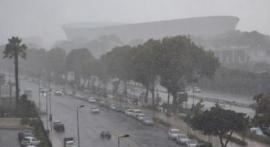
As an intense cold front moves away from most parts of the country, the Western Cape is still at risk as it prepares for a second cold front, according to the South African Weather Service (SAWS).
“The Western Cape faces another cold front as the rest of the country gets a bit of a break from the hectic weather we've faced over the past few days. Strong interior winds are still forecast,” the SAWS said.
The Northern Cape, North West, Free State, Eastern Cape interior and Western Cape have been experiencing wet, cold, and windy conditions with light snow.
The series of cold fronts hitting the country also brought widespread and disruptive snowfall over the southern and western high ground.
This was accompanied by damaging winds over the interior and the coastline as well as high seas along coastal areas.
The Western Cape saw severe disruptions and damage, including loss of shelter in informal settlements, fallen trees, electricity outages and road closures due to snow or flooding.
The weather services has since upgraded the Western Cape’s weather warning from level 6 to 8.
According to reports, the inclement weather in the Western Cape affected 7 000 structures in informal settlements across Cape Town after 70 neighbourhoods were flooded.
The Liesbeek, Lotus and Eerste rivers in Cape Town have all begun to burst their banks.
“We’re still expecting a lot of strong wind and rain this week. Please stay safe. City teams are addressing each localised flooding situation,” said Cape Town Mayor Geordin Hill-Lewis.
The Western Cape Education Department (WCED) said the wet and cold conditions prevented five schools from re-opening yesterday as public schools began their third term across the country.
According to the WCED, the schools were closed due to either flooding, inaccessibility to access routes or damage to the school building.
In addition, 82 schools have reported damages, of which most cases were minor, with 31 cases regarded as more serious.
“This includes schools where roof sheeting was blown off,” the provincial department said, adding that repair work has already begun on some projects.
Western Cape Premier Alan Winde expressed his gratitude to the province’s disaster management teams and stakeholders who have worked tirelessly throughout this difficult period.
“Your steadfast dedication to serving the residents of this province is deeply appreciated,” said Winde.
KwaZulu-Natal
Meanwhile, KwaZulu-Natal has been dealing with extremely high fire danger conditions.
The KwaZulu-Natal department of Cooperative Governance and Traditional Affairs confirmed veld fires in uMlalazi Local Municipality in Eshowe where a 67-year-old was burnt to death when his house caught fire.
King Cetshwayo District is said to be one of the most affected areas, with uMfolozi, uMlalazi, Mthonjaneni and Nkandla being the hardest-hit municipalities.
According to the provincial department, 144 people in the district were affected, leaving 53 people homeless after 48 homes were partially damaged and 27 destroyed.
“The department is working closely with the municipality to ensure adequate support and relief for the affected families, with social partners setting up soup kitchens.”
Eastern Cape
Strong winds continue to wreak havoc in the Eastern Cape, damaging houses and disrupting the flow of traffic on the roads as vehicles have been toppled over, on the N2 near Dutywa.
“Road users, motorists in particular, are urged to be extra cautious or avoid being on the road completely if their travelling is not essential,” the Eastern Cape Transport Department said.
On Tuesday afternoon, the provincial department finally reopened the Barkly Pass on the R58 Road between Barkly East and Elliot to traffic, after it was closed for 30 hours, due to heavy snowfall, on the morning of Monday.
“Graders had to be used to clear off the thick blanket of snow that stubbornly covered the road surface.” – SAnews.gov.za


